Are you considering adding plants to your home? Maybe you’re looking for potted greenery to add a spot of color to your living area. Or perhaps you’re eager to get started with container gardening on your patio this spring.
Whatever the case, you’ll be happy to know that indoor and outdoor plants offer us more than pretty colors and fragrances to enjoy. Plants give people health benefits as well, and some of those benefits might surprise you.
Indoor Plants
Adding houseplants to your home helps to bring a touch of nature indoors, which is especially helpful when you’re stuck inside due to weather, travel restrictions or poor health.
The right houseplants brighten up living spaces by adding a decorative element. Even better, some indoor plants have special qualities that benefit their owners.
Here’s a quick look at a few easy-to-find indoor plants for health benefits:
1. Spider Plants
Spider plants are a popular houseplant because they’re easy to grow and tough to kill. They thrive in low-light areas of homes and can survive even with infrequent waterings. They also have a positive impact on air quality.
Spider plants help remove harmful pollutants such as formaldehyde and benzene from the air. (This is known as phytoremediation).
Sources of formaldehyde in a home include construction materials and carpet. You can find benzene in furniture polish and laundry detergents. Consider adding one or two spider plants to your bedroom to help clear the air while you sleep.
According to the American Society for the Prevention of Cruelty to Animals (ASPCA), the spider plant is non-toxic to dogs and cats.
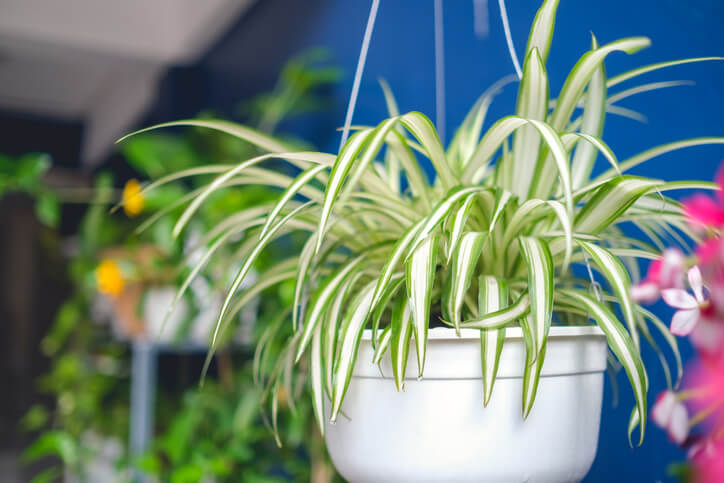
2. Snake Plant
Snake plants have a distinctive shapely and sharp leaf. They also help remove toxins from the air, making them another good choice for a houseplant for your sleeping area.
Like the spider plant, the snake plant is easy to care for and requires little light. This plant releases oxygen into the air, and it also helps purify the air by removing four common household pollutants — formaldehyde, benzene, trichloroethylene and carbon monoxide.
Caution for pet owners: Snake plants are toxic to dogs and cats if ingested.
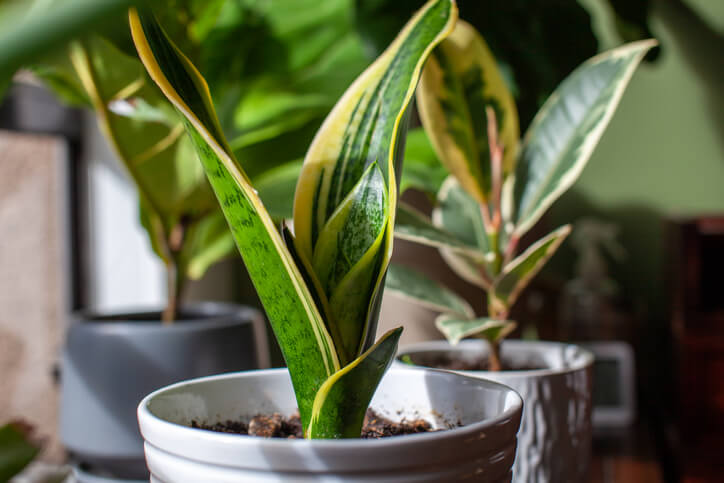
3. Peace Lily
With its dark foliage and white tubular flowers, the peace lily offers a dramatic focal point for any room, but it’s also a hard worker when it comes to improving air quality.
With a pretty floral scent, the peace lily helps absorb commonly found household pollutants such as ammonia and formaldehyde. In addition, the peace lily can help purify household air polluted by trichloroethylene and xylene.
These pollutants occur in many household cleaners, glue, polishes, waxes and construction material, and they may negatively impact your respiratory and immune system.
Caution for pet owners: Peace lilies are toxic to dogs and cats if ingested.
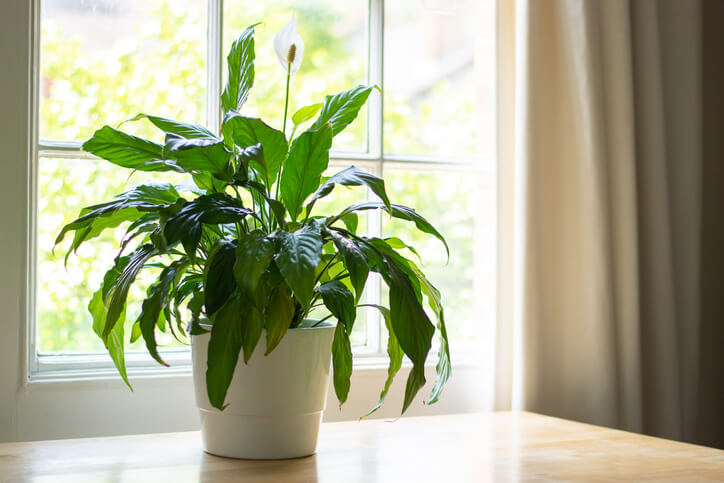
4. Aloe Vera
Perhaps one of the most recognizable houseplants, aloe vera contains a soothing gel within its fleshy leaves that has long been used to treat burns.
One of the benefits of aloe vera is that it is easy to use. Simply break off a small section of the leaf and apply the healing gel directly to sunburns, cooking burns or skin irritations.
Aloe vera love humidity, so keep it near your shower and watch it thrive.
But take note, aloe vera leaves are poisonous if ingested! This goes for pets as well – aloe vera is toxic to dogs, cats and horses.
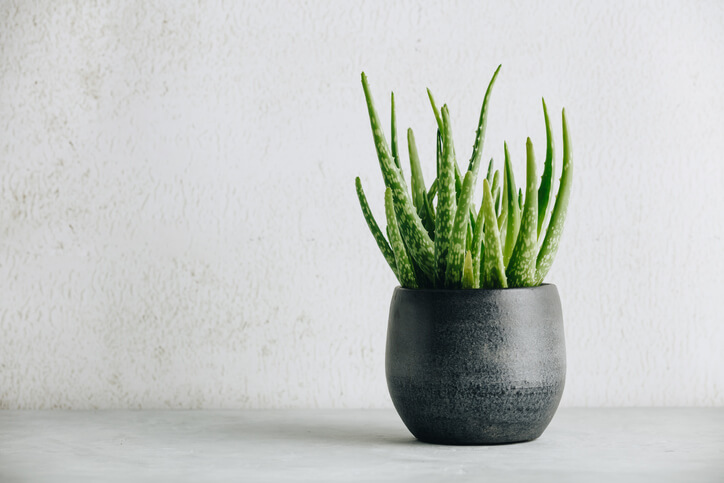
5. English Ivy
Do you live in a damp or humid area? If so, consider adding a few pots of English ivy to your home.
This trailing (or climbing) vine suits a wide variety of décor and styles because it stays green all year — indoors and outdoors too, (temperature permitting). Even better, it helps prevent mold development indoors. Mold might contribute to lung and respiratory issues.
English ivy is poisonous if ingested so keep this in mind if you have small children, grandchildren or pets.

6. Boston Fern
If you battle constant humidity in your home, consider the good old-fashioned Boston fern. With its easy to recognize leaves and fan-shaped foliage, the Boston fern is a phytoremediation powerhouse as it absorbs harmful gases through its leaves and roots.
According to the Merriam-Webster dictionary, phytoremediation is the process by which green plants remove chemicals and pollutants from the air. By removing pollutants such as formaldehyde from the air, you reduce the harmful chemicals that you and your guests breathe in every day. This is another plant that does well indoors and out.
According to the ASPCA, the Boston fern is non-toxic to dogs and cats.
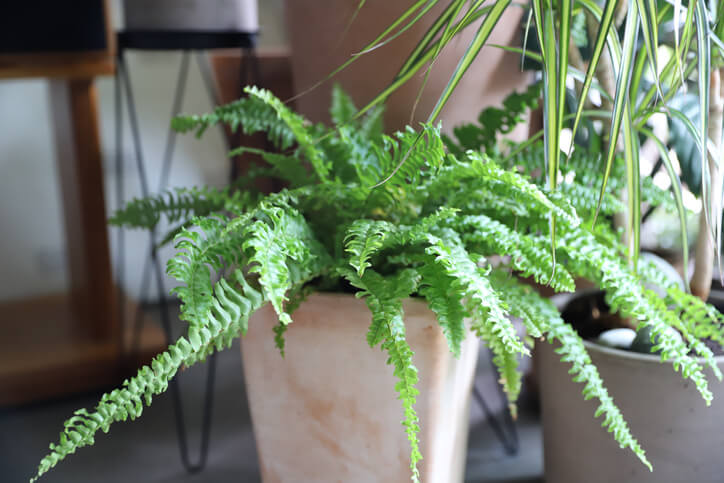
Outdoor Plants
Looking for a few good plants to add some pizzazz to your porch or garden? If so, consider outdoor plants for health and well-being benefits. Here are five you might like:
1. Calendula (Pot Marigolds)
They come in pretty shades of gold, they grow fast and they’re a workhorse in the garden. Yet you might be surprised by the many health benefits of the common marigold.
Calendula flowers have strong antiseptic and antibacterial properties and can be used to make ointments and salves that help heal skin wounds, treat diaper rash and reduce inflammation due to skin conditions like eczema.
Pot marigolds have vibrant orange flowers which bloom in late summer and early autumn. As a side benefit, they can help keep insects away.
According to the ASPCA, pot marigolds are non-toxic to dogs and cats.
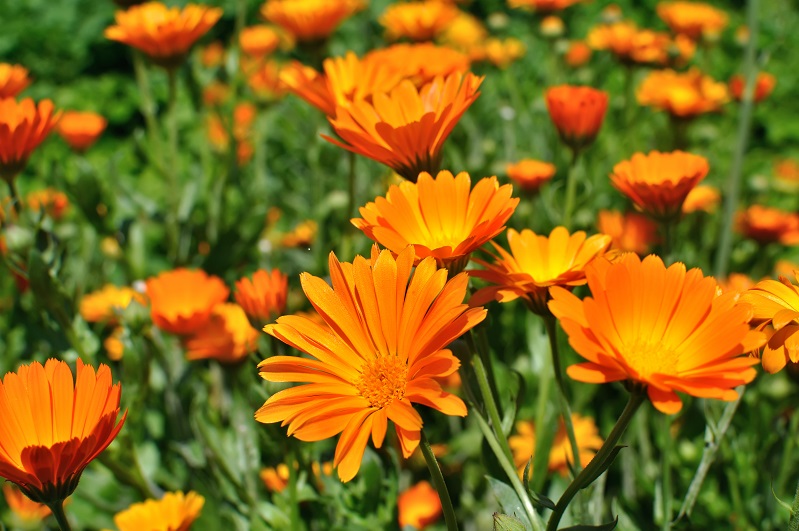
2. Mint
If you’re a new gardener, growing mint outdoors (or indoors) is a good introduction to herb gardening. Mint is easy to grow — but watch out as it can easily take over your garden!
In addition to the distinctive scent and flavor, all varieties of mint have health benefits. Cloth compresses soaked in mint leaf tea can help alleviate painful sunburns. You can also freshen your breath and combat oral infections by chewing on a few leaves. Or help keep fleas out of your pet’s bed by adding a mint leaf sachet to the stuffing. And mint is also a great garnish for a drink!
Caution for pet owners: Mint is toxic to dogs, cats and horses if ingested.
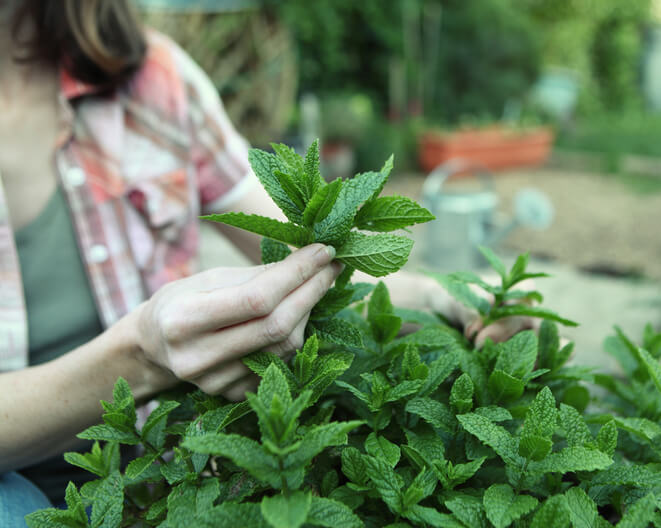
3. Citronella
Study after study has shown that outdoor gardening has significant physical, mental and emotional health benefits. Yet pesky mosquitoes can make it difficult to complete your gardening tasks. And they also make it difficult to enjoy your outdoor space.
Add a few citronella plants to your flower beds to help keep those annoying bugs away. If you plant them near walkways, as you or your pet brush past them, you’ll repeatedly release the citrus fragrance to ward off bugs.
Citronella emits a strong yet not unpleasant lemon scent, and it also has several health benefits. Citronella has anti-fungal properties that can help treat infections and promote the healing of wounds.
Caution for pet owners: Citronella is toxic to dogs and cats if ingested.
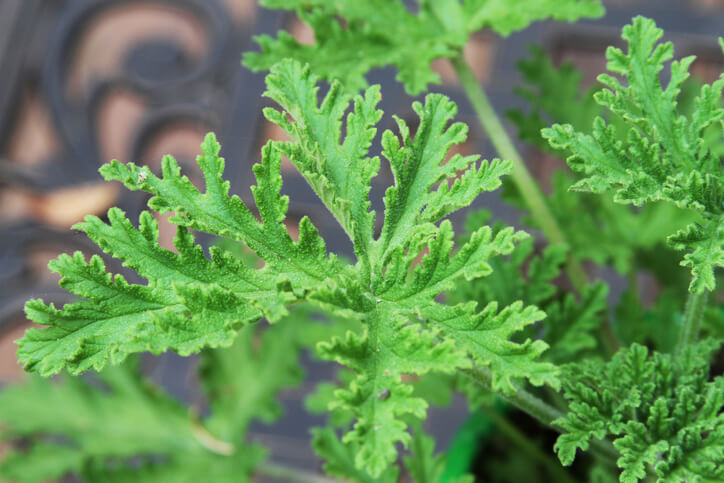
4. Lemongrass
This fast-growing plant is a good choice for raised beds or patio garden containers if you’re looking for a decorative and fragrant grass. And lemongrass also has numerous beneficial properties to help boost your health. These include antioxidant and anti-inflammatory properties from quercetin, which is helpful in slowing down cancer growth and even combats heart disease. Recent studies suggest lemongrass could also assist in lowering cholesterol.
Lemongrass is easy to snip off and add to stir-fries or salads for a citrusy flavor addition.
Caution for pet owners: Lemongrass is toxic to dogs and cats if ingested.
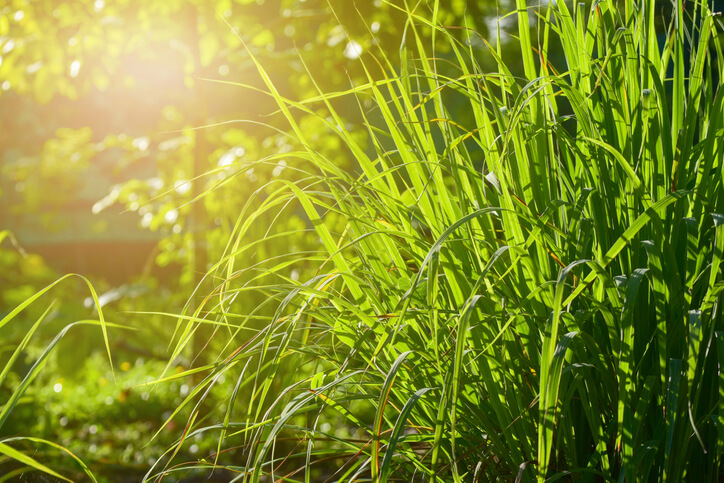
5. Roses
You likely already know that a rosebush is a beautiful addition to your outdoor landscaping, but did you know that rose petals and rosehips are used for a variety of healthy and delicious recipes too?
Rose petals have been found to help ease inflammation. And since they can also help with sedation, they could prove beneficial in easing anxiety or sleep issues. In addition, their gentle antiseptic properties mean the petals can even be placed right on cuts and scrapes to help them heal quickly.
Rosehips are the fruit of the rosebush, are very high in vitamin C and make a delicious tea.
According to the ASPCA, roses are non-toxic to dogs and cats.
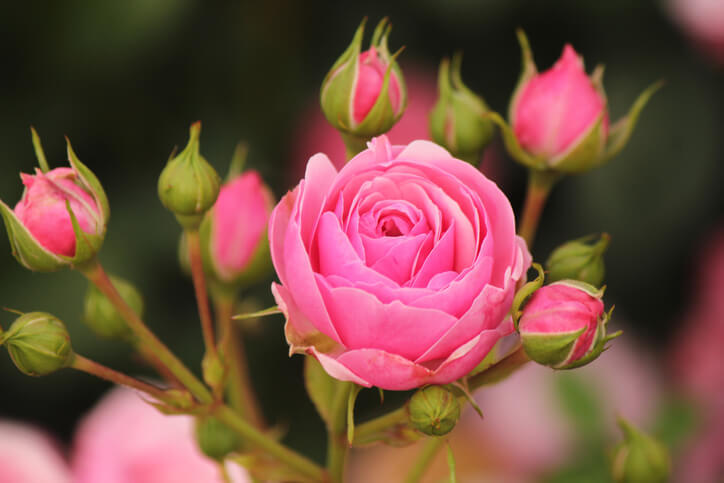
Choose Your Indoor and Outdoor Plants Wisely
Caring for houseplants can become a relaxing and enjoyable hobby. Not only can you use them to beautify your home, but you can also select plants for their health benefits. However, it’s important to consider your lifestyle as well as how these plants could impact other people or animals living with you or visiting your home.
For more information on poisonous plants found indoors and out, visit the Poison Control Center site. And for information on commonly found plants that are poisonous to family pets, see the Poisonous Plants list on the American Society for the Prevention of Cruelty to Animals (ASPCA) website.
What’s your favorite houseplant for indoors or out, and why? Share your recommendations by commenting below.
Disclaimer: This article is meant for informational purposes only and does not constitute medical advice. Always consult your health care provider before self-administering any plant-based treatments.


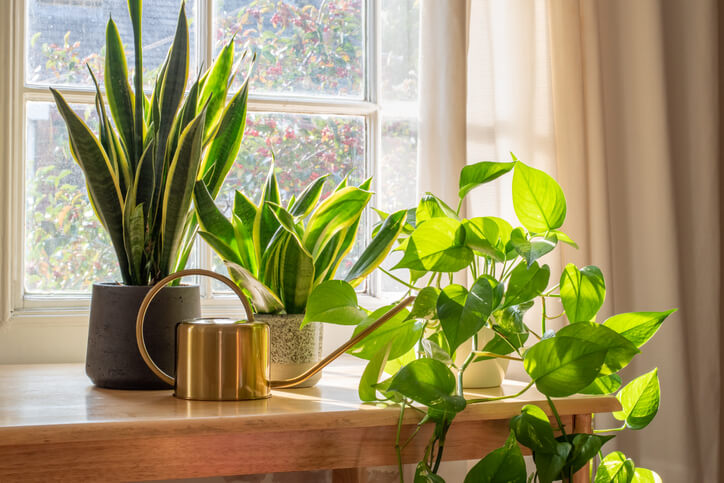
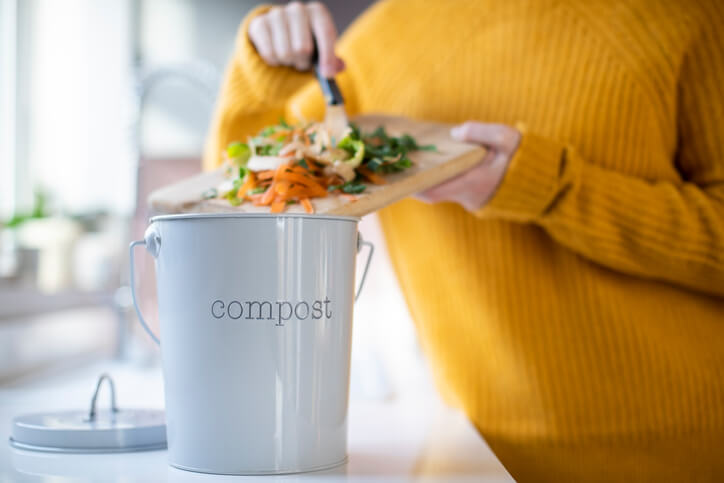

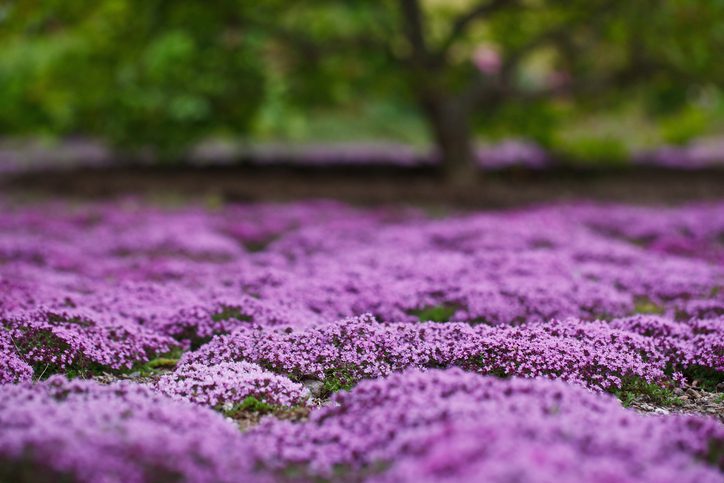

All time favorite plant…morning glories. Favorite food plant…tomatoes. Morninglories are hard to grow in my yard but I keep trying!!! Last year I grew the best tomatoes for the first time. I’m hoping to have the same luck this year.
Very helpful.
I like your idea how’s plans outside plants I’ve been trying to do that so many weeds to deal with especially crabgrass
I appreciate your list of house and garden plants for health benefits. My granddaughter has recently moved into a new place and would like plants for house warming gift so I have at least 3 from your list to consider.
Thank you
Thanks for information on Spider plants and Aloe Vera.
Interesting article…..are there other NON TOXIC plants that grow well indoors?
Have snake plant, philodendron & just added succulents to my plants. Find it fun to watch them prosper. I use jobe spikes to fertilize.
Plants are great, BUT , when you have Pets , Cats and Dogs , and other pets also , YOU have to be very CAREFUL what you bring in the Living areas . Some of them are Very Poisonous . Just thought this should be mentioned.
Thanks for the house plant information…
Thank you for this article.I have no indoor plants, and most all of the few outdoor plants I have are faux. Your article was inspiring. I think that, just maybe, I’ll attempt another try for a couple of indoor plants. I live in a house built in 19 52. So heaven knows what’s in the air.
I’m just going to put some flowers in my new apartment. I don’t know which one to choose yet. Will, for example, Hebe (a plant somewhat like a round hedge) also work well at home? It always grows into a ball, with small green leaves. I mean dense plants that are easy to grow.
May want to double check the info on marigolds. I believe you’re referring to ‘Pot Marigold’ which is actually Callendula.
Lena – Thanks for catching that! We have updated the article accordingly.
Very informative and useful tips with excellent presentation. Looking forward to lots more articles. Thanks for sharing ideas and such an informative article.
You’re welcome, Sophia!
This is great, these indoor plants will help reduce diseases.
Great point. Thanks for reading Extra Mile!
Thank you, Larry
good information to know.
Plants placed inside the house made me feels cooling and relaxing. Very informative and useful tips about indoor plants with excellent presentation. Looking forward to lot more article about indoor plant and how to use them for kitchen, Living room and more. Thanks for sharing ideas and such informative article.
Thank You For Sharing
Great idea for another article. Thanks for reading!
I have been told I have a brown thumb. Maybe these tips will help change that.
Coreen – Good Luck!
Very good information about indoor and outdoor plants. Request you to share more options on indoor plants.
I have a large philidandrian that I love.it just keeps growing.i also have spider plants that help with the air quality. I like lots of plants around me .it helps if you are depressed and gives you something to take care of.
I love plants but I don’t know to much about them, anything can help. GOD BLESS MERRY CHRISTMAS 🎄
Hello to you all. My mother had all these plants all the time. Now I know why. Wow. Alot about the benifets of plants is awesome. Thanks alot. Now I gotta do these plants myself. Dee
Maybe sometime l can post my indoor and outdoor plants.
God bless to everyone ❤️
This seams to be very helpful thank you
This article help me to know the important of my plants. Thank you very much for the information you’ve share. Looking forward to read more article from you to help us to our day to day living.
I like very much this kind of article. It is very informative. Matter of fact our home is like a mini forest in an indoor setting…. I could really feel the freshness of air I breath in not to mention the fact that the plants inside our home do make me smile a lot.
This info is great. I have 3 cats and I don’t want to have the wrong house plant. I will be planting in my side yard this fall and I want cat friendly plants. Thanks!
Beautiful thank you
What great information – that I can actually use. Thank you
Thanks!💕💕💞❤️🙌🏾🙌🏾
Pothos is a great indoor plant. Thrives on office lights to added decor. Fast growing and easy to propagate. Great sharing plant.
I’m interested in having plants in my apartment. Well actually my husband says he wants them now. But in the past my plants always seem to die on me. Can you help? I love plants. Thank you
very good info and a help in keeping our plants healthy.
Very interesting article, from my Insurance Co. I would like to see plants and trees that are good for people living in the mountains and are subjected to wild fires. what would be good to plant around their property to help hold down the spreading or retard the flames somewhat.
Thanks for the info on pets ad I am looking for plants for my catio.I love a variety of plants and fruit trees but 3 of my most popular are Roses, Vinca’s and Amarillis.
This was very useful information
How about recommending planting native plants that are healthy for us in many ways, as well as healthy for pollinators which in turn help us get healthy food? Too many plant nurseries or gardening shows only focus on non-native plants which have very little benefit for us or for the environment. There are places that provide native plants, however, and I am glad to see that more people are beginning to plant them.
Before grade school I helped my father plant and tend a big garden. Now, 95 years later I have more than 30 pots in my condo. I enjoy trying new plants. I planted a date seed (now 6 ft tall); fig seeds (big leaves); pineapple top; and most of the plants mentioned (lots of oxygen). Outdoors, having moved often, I brought along slips from my grape vine to each new place, and always planted roses. When I get old, I hope they allow plants in the nursing home.
This is a very informative article. I enjoyed reading about all the plants. Some were new to me but most I’ve had before. I also liked the info about being poisonous to dogs/cats. I wasn’t aware that so many plants could be harmful to our pets. Thank you.
I love Sunflowers, some of mine are over 6 feet tall! I love the Roses and Azaleas. I have the spider plant inside in the winter, handing under a tree in the summer. I have a snake plant inside, also. I have a Angel bush that blooms all summer. I like all types of flowers, inside and out!
I think plants are beautiful but would like to know about watering and vitamins to have healthy pleants.
One of my favorite house plants is an Aloe Vera & a Snake Plant/Mother-in-laws Tongue, Spider Plant, they are very easy to care for.
Several of my favorite outdoor plants are French & African Marigolds, I also love succulents like Hens & Chicks & Lilies such as Calla, Cana, Stargazer Lilies & Iris’s & Lavender, since the Gladiolas & Marigolds are deer resistant & very pretty & easy to care for.
My Gladiolas, Star Gazer Lilies have bloomed & look great, some Lavender I had removed, still comes up & I am afraid it will choke out my Gladiolas. Being so close to the house is another concern, whoever had planted Lavender before me, may not have known that it could be invasive, even after the roots are removed!!! I am trying to grow Onions, Celery & Lemons, they are so easy to grow.
Celery-just remove the bottom of the bunch & plant in a partial sun/shade area. My celery is doing great.
Onions- remove the bottom & stick 4 toothpicks into it in some water, watch for the water to turn cloudy & refill the container with fresh water & watch for the roots, when you see them, plant the onion.
Lemons- I just remove the seeds before serving the lemon, I took a handful of lemon seeds from a friends & planted, they are really growing fast & some lemons I got from the store, I did the same thing to them & planted them, they are really growing fast!!! They need sun & partial shade in the afternoon & lots of water.
I think Bambi likes my plants & succulents, I have planted Marigolds, Black-Eyed Susans, Calla & Cana & Asiatic Lilies & my Easter Lily, hopefully they will come back & reproduce. I don’t think that Bambi got the message that Marigolds are deer resistant. : $ Bambi ate some of my Hydrangeas, I did put out Deer Away, I am hoping that works & keeps Bambi out of my plants!!!
Would love an article about plants that are poisonous to pets both indoor and outdoor.
Miriam – Thanks for reading. That’s important info and we’ve just added it under each plant listed here.
great info – I now know what I want to add to the indoors.
Nice info. will actually head over to home depot/ lowe’s and look for a few of these plants.
thanks
Enjoyed reading this information on indoor and outdoor plants. I love flowers and plants and hav even gained some ideas about indoor plants. Thanks.
Citronella and lemon grass are closely related grasses. What you have pictured for “citronella” is a scented geranium NOT citronella. Would be helpful for the author to do their homework first.
What an excellent article… made a copy, and will start putting some plants in my house.
I Really appreciate the article on this subject!!
PLEASE post more articles like this!!!
I learned something new today from the article, and MORE from all the comments!!
Thanks, guys!! ♡
I love the way houseplants look, and have had them for years. However, I recently tossed everything out because several of the plants smelled moldy and I couldn’t figure out how to re-pot them, and didn’t even know if that would work.
How does one prevent the soil from getting mold?
As a horticulturist, we would always use Pro-Mix brand potting mix for our containerized plants. Most good quality potting mixes are sterilized & high in milled sphagnum peat moss which should resist mold growth. These mixes also contain vermiculite & perlite for moisture control & drainage. Do not use the heavy black “Michigan Peat” as this does not drain well nor is it sterilized & may also contain some weed seeds. Never allow your plant pots to sit in water filled saucers whether indoors or outside. Water filled plant saucers causes root rot & sour soil. If they are outside they become breeding habitats for thousands of mosquito larvae. Also allow your plants to dry out some in between watering especially during the winter season when they are brought indoors & do not receive as much sunlight.
very inspiring to make a more healthy indoor environment!
The plant information is very helpful as I am so interested in the beauty and usefulness of them in and outside my home.
Problem with indoor plants !!?? My cat would use them for a potty place ??? What’s advice on that?
I live in a garden. A 1 bedroom apartment. I have 33 orchids and 7 other plants. 8 orchids are in bloom. I
I am 83 years old and doing fine. I was given a dying gardenia s plant on it’s last legs and it just finished giving me 15 blossoms. I am thankful.
This was an informative and enjoyable topic, thank you. I’d like to add, one, when planting mint outdoors be sure to plant in a pot (you can remove the bottom, if added to a garden bed). Mint will otherwise over run a garden in a few years. Two, with roses, be sure to refrain from pesticide use both on the plant and in the soil, if you want to fully and safely take advantage of it’s many uses for the body. Enjoy!
I enjoy my Shamrock plant although it needs frequent watering.
Thank you , very helpful
I like the old time plants, such as spider plant, snake plant, norfolk pine, and many other green houseplants.
Right now I have set out rain lily (easy name, but has fancy name in books) I have 5 on my deck and 1 large at driveway. They do not grow over winter months & keep in garage. Can not be in place that would freeze. This plant goes back to a friend of my mother’s, who gave her 2 large pots of these and when she could not take care of or got tired of, gave them to me. I shared the bulbs w/so many friends and family over many years. I also had 4 large geraniums in garage and plan on putting in large heavy pots & set on front porch. There is so much wind in my area & heavy pots are required so they don’t blow off porch.
I have cut back on house plants due to not being able to take care of so much, but have 2 african violets, 1 poinsettia, & 2 small orchids, and 1 large that daughter & grandaughter gave me for mother’s day. My son & wife & grandson always see that I have bouquets & treasure the houseplants as well as bouquets.
My bad knees & feet/toes do not allow me to do any outside weeding or planting, which I loved for many years. Therefore, the inside potted plants help me to still enjoy my plants.
My son mows/edges, & does some weeding & mulching, as well as a friend from Church who helps w/weeding, mulching, & transplanting plants to a different spot.
Hi,
I have a Pothos & I also have a ZZ plant, just wants filtered light water when soil is dry. The ZZ plant is almost care free as well. If it blooms(I have never seen it bloom), I take a wet cloth & wipe the leaves off every now & then.
Enjoy your plants
I really liked this post. I had no idea about some of these facts. I wanted to copy it but there was no place to click to print out. Do you have pamphlet with this info?
Dawn – Thanks for reading. We’re so glad you enjoyed the article. There should be a print icon near the title of the blog post that you can click to see a printable version.
Enjoyed the website! Thank you.
Very interesting and useful information!
I don’t have peace plant in the house because it is poisonous to pets. I have four additional favorite houseplants that are hardy and last for years: Christmas/thanksgiving cactus (lots of winter flowers), sheflera, jade, and shamrock. I put all of them out for the summer. The first three are easy to reproduce–just snip off a piece and put it in nutritious potting soil.
Thanks for the comment, Jean. We’ve just added info under each plant about its safety for pets.
Superb article
Some plants great for HARMONY N HEALTH
As an avid gardener I was surprised to see plant information on my insurance company email. What a wonderful idea! Several of the plants listed for indoor use are also noted to make house pets sick such as the peace lily. Could you add that information? Thank you for this interesting post.
Olivette – Thanks for reading! We’ll be sure to add info about safety for pets.
Very good information. Thank you. I’m into plants and like knowing more.
Awesome and useful article on the many wonderful benefits of nature/plants. Please consider sharing similar such articles on nature.
best of all plants I like the african violet there flowers are always beautiful
I really appreciate the information about these plants.
Loved this article!! Thank you.
Thank you for the gardening tip, as we age it is important to take the time to plant gardens [indoor and out] it is good exercise and a good mental health booster.
Thanks
Thank you
Great recommendations, but an individual statement for each regarding pet safety would have saved everyone the trouble of looking them all up.
Thanks for reading and for the valuable comment. We’ve just added this information under each type of plant.
This is truly good news to find out the benefits of plants from the inside and outside thank you
When my middle son was in his teens he accidentally backed into his buddy’s hot, motor cycle exhaust pipe. When he quickly pulled his leg away, the outer layer of skin remained on the pipe. I quickly cut a piece of Aloe, slit the leaf open & laid it (gel-side down) on top of the burn, and wrapped his leg with gauze. We applied ice for several hours. Aloe was reapplied every hour or so. Not only did it help with the pain but he now
has no sign of the burn.
Thank you for the beautiful information you provided for the other plants.
For outdoors I have incorporated a wider diversity of native wildflowers into my landscape to attract bees, butterflies, birds, other beneficial pollinators, & wildlife. It rewards me to see that I am helping in a small way to bring back what was lost. There are Native Plant Nurseries & organizations in most states that can help guide homeowners who are interested. Buy from as close to your local area as much as possible. Purple coneflowers, Butterfly Milkweed, & BeeBalms (Monarda) are a must in the mid-West & there are many other beautiful flowering native plants, grasses, trees, & shrubs that can fit nicely into a suburban garden.
Bring Nature Home.
My wife has a green thumb but I can remember my mother telling me to go outside by the water faucet to pick some mint pieces for the ice tea.
Can anyone tell me what is happening to my Callia Lillies? And what I can do to stop them from dying?
The leaves in one pot is withering somehow and is dying every day there is a leaf that is down sometimes broken in half. I can’t send a picture through this. Please help.
Very helpful info.
Thanks
Thank You
I am so glad you put this article in. Most of these plants I have had and will try to get some of them back as it makes so much sense to help with the air in the home.
I learned from this article, thank you.
The air quality improvement information is as interesting as the encouraging recommendations for easy maintenance, indoor and outdoor greenery in various climates.
While many of us are aware of the medicinal qualities of, say, aloe, who knew about rose hips!
You should not recommend English Ivy as it is an invasive plant and if planted outdoors will rapidly spread and take over landscapes including parklands, crowding out native plants. They are a real problem in the pacific Northwest and elsewhere.
Thank you for the info
There is also edible aloe vera. It is good for bodies.
What is the name of the edible aloe Vera? There is a cancer tonic that can be made with the edible one but I can’t remember the name of the aloe plant.
Aloe Vera Barbadensis is the most common Aloe plant,
and there are also many other types of Aloes.
Be so careful and research befor ingesting or believing dome of these wive’s tails. I do not see primary resources. I tried several highly recommended herbal remedies and had liver damage and one allergic reaction and almost suffocated! A naturopathic doc recommended saying “natural” can’t hurt you. Well, yes it can. They have not been checked for soil contaminants and they are not
This site is very helpful. I hope to see more of them.
Thank you Janice Ward
Please be aware if you have pets, though, that some plants like the peace lily, can be poisonous to them.
Great reference:
“Spathiphyllum contains calcium oxalate crystals that can cause oral irritation, excessive drooling, vomiting, difficulty in swallowing and intense burning and irritation of the mouth, lips, and tongue in pets who ingest.”
Barbara – Thanks for your comment. We’ve added info under each plant type about its toxicity for pets. We want to keep our four-legged family members safe too.
As a Horticultural Therapist, more reasons than ever to grow your own food, and keep a house and yard full of greenery ! Thank you .
Thanks for this information,
Mint is a great plant, but watch out. It spreads easily and can take over an area, like an herb garden.
Ty I have learned a lot being a house plant heater. It gave me a new insight
Thanks for the information
I learned alot
I learned a lot from the article and pictures on healthy plants.
Thank you for this important plant information. I’m sure that I have indoor pollution. Will use your guide to have a more healthy environment.
What is a rose hip?
Thank you!!
Very enjoyable and informative article.
The benefit of plants is sometimes quite subtle,
even the edible ones.
Rosehips are the fruit of the rose. They look like berries and vary in size according to the size of the rose. Very high in vitamin C.
What a find!! I was happy to find this website which gives me clues as to what to do for my new house.
great info!
Thank you! Loved this and it confirmed that I was on the right path. Will be adding a couple new plants too. If you are looking for additional information to provide….include plants that do well in the southwest heat
Great article and very helpful about the indoor plants.
The section about marigolds is misleading, however. The “marigold” that is used to soothe the skin is actually calendula, which goes by the common name of “pot marigold, ” hence the confusion, probably. Don’t use tagetes–garden marigold–on your skin, or in creams!
Orange trees are nice.
The blossoms put out the most wonderful aroma. My miniature one got old and finally died. Need to get another.
I love plants in general , so many to love my favorite is confederate Jasmine smells so very good hardy as can be also loves to climb I put it at the end of my porch and let it attach to the railings just PERFECT!!!JAPANESE MAPLE I TRULY LOVE AS WELL THE LIST GOES ON AND ON!!
thank you for recommending the right plants. What I learned is that native plants are preferred for my area as they are non poisonous for the bees and butterflies. I may have some plants
that I have to remove. Pls let me know. Matje Mattern
Curious, does the Jasmine attract bees or wasps?
Hi,
This is a great site, very helpful about plants.
Thanks Darlene
Was very good information liked very much keep up and thank you🤔
Very nice and good information thank you very much hope you don’t share peoples information
I love the name and the look. I love to see them grow.
Peace lilies in various sizes. Ease of growing. They let you know when they need water by drooping their leaves. Great for low light conditions. Need to only be watered once a week.
Snake plant also great for growing in low light and ease of care. Requires watering only every two to three weeks.
Love ferns; however Boston ferns shed a lot of leaf debris indoors if not misted and watered regularly. Will also outgrow container more quickly than most plants and is hard to divide into smaller plants. They are a gorgeous plant though.
I am always interested in plants and how to grow them. Thanks for information.
Terrific read! Thanks for the info on plants. I plan to add some I don’t currently have indoor and outdoors
Thank you
Love this info!
Good article. Thanks!